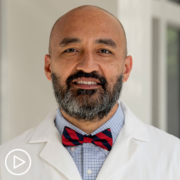Myeloma Expert Debunks Common Clinical Trial Misconceptions
Myeloma Expert Debunks Common Clinical Trial Misconceptions from Patient Empowerment Network on Vimeo.
Dr. Abdullah Khan, a myeloma specialist, shares advice for individuals that may be hesitant to participate in a clinical trial, reviews the phases of trials, and explain the informed consent process.
Dr. Abdullah Khan is a hematologist specializing in multiple myeloma and plasma cell disorders at the Ohio State University Comprehensive Cancer Center – The James. Dr. Khan is also an assistant professor in the Division of Hematology at The Ohio State University. Learn more about Dr. Abdullah Khan.
See More from Myeloma Clinical Trials 201
Related Programs:

Understanding the Role of Clinical Trials As a Myeloma Treatment Option |

Considering Joining a Myeloma Clinical Trial? Questions to Ask Your Healthcare Team |

|
Transcript:
Katherine:
What would you say to someone who’s hesitant in participating in a trial?
Dr. Khan:
Well, the decision to participate is complex and personal, but the ultimate decision regarding trial participation rests with the patient. So, some of the reasons why patients might be hesitant, they might have distrust toward the medical community given the history of clinical trials in this country. If we take the example of the abuse of African American patients during the Tuskegee syphilis experiments, that’s just one example.
Katherine:
Yeah.
Dr. Khan:
Another reason patients might be hesitant is they don’t like the idea of being randomized to the treatment that they’re going to get.
So, they might end up getting a placebo. They might get another standard of care. And they might not get that new, fancy drug. So, giving up that level of control does require some compromise. Another reason is the uncertainty of the potential side effects of the chemotherapy drugs, especially if you’re participating in an early-phase clinical trial.
Furthermore, trials require very defined and frequent monitoring sometimes. So, some patients might not like the time commitment to a clinical trial. Another reason might be that there are concerns for cost. I can alleviate that concern by saying that typically there are mandates that the insurer cover the routine costs of clinical trials.
Katherine:
You mentioned some misconceptions. Are there any others that patients might have about participating in a trial?
Dr. Khan:
I guess the two most common things, the first one, and I think all providers have heard this, “I will be treated like a guinea pig.”
Katherine:
Yeah.
Dr. Khan:
For me, that is probably the furthest from the truth because of all the safeguards in place. Clinical trial participants are followed the most closely and probably get more medical attention than someone who is not on clinical trial. To participate in the clinical trial, the participant has to voluntarily – and that’s the keyword – sign an informed consent form. And finally, the participant can also leave the trial at any time for any reason.
Another common misconception is that clinical trials of dangerous because they use untested drugs. There might be some truth to that. There are many phases to clinical trials. And in some early-phase clinical trials it is true that participant may actually be the first to ever get the new therapy.
So, some of the outcomes are not known. But in late-phrase clinical trials, tens to thousands of patients may have already been treated with the study drug, so there a lot of preliminary safety data and also efficacy data.






